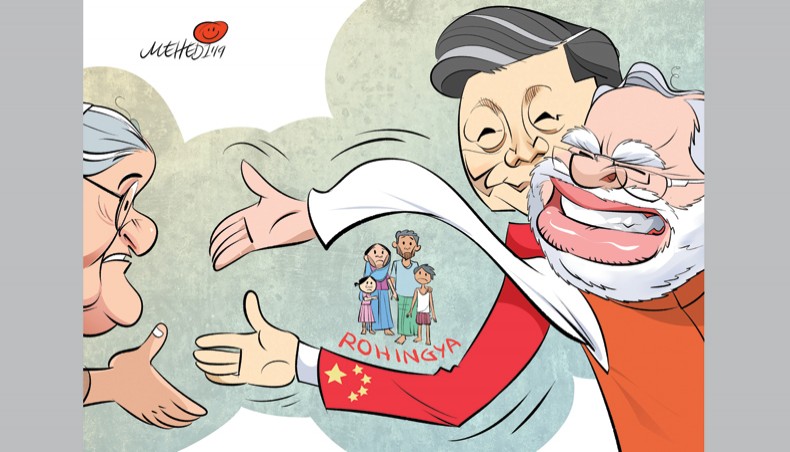ROHINGYA RETURN India, China apathetic to asking Myanmar to ensure rights
India and China are indifferent to Bangladesh’s request to use their influence on Myanmar to create conditions conducive to repatriation of forcibly displaced Rohingyas to Rakhine State ensuring their rights.
The government has kept requesting strong political support from India and China, who are expected to maintain strategic partnership with Bangladesh, in solving the Rohingya crisis ensuring their rights in Rakhine.
Both the countries, however, has kept limited their efforts in extending ‘assurance’ of ‘continued support’ for the return of Rohingyas to Rakhine in addition to sending relief for them, said diplomatic sources in Beijing, Dhaka and New Delhi.
‘We, as a country, are in a strategic gap in resolving the Rohingya crisis which may haunt us for years,’ Bangladesh Enterprise Institute acting president Humayun Kabir told New Age on Wednesday.
In the latest incident, Bangladesh raised the matter with India at a meeting of the Bangladesh-India Joint Consultative Commission in New Delhi in February.
Foreign minister AK Abdul Momen raised the matter with Sushma Swaraj only to receive ‘a routine response’ from her with an ‘appreciation for the humanitarian gesture of Bangladesh’ for hosting a large number of displaced Rohingyas, foreign ministry officials said. Foreign ministers of the two countries are co-chairs of the commission.
Sushma She ‘assured’ him of India’s ‘continued support’ to safe, speedy and sustainable return of the Rohingyas, according to the joint press release of the two countries.
Prime minister Sheikh Hasina and Abdul Momen’s predecessor AH Mahmood Ali too discussed the matter on various occasions with their counterparts Narendra Modi and Sushma Swaraj respectively, in addition to the secretary-level meetings between the two neighbours.
India and China, however, continued to rely on ‘the narratives of the military-controlled Myanmar’ in assessing the Rohingya situation from ‘development’ and ‘security’ dimensions, a senior Bangladeshi diplomat said, adding that there was no substantive shift in statements made and actions taken by the two countries since the beginning of the latest influx on August 25, 2017.
Chinese foreign minister Wang Yi hosted at least three meetings of foreign ministers of Bangladesh and Myanmar in addition to deploying a Chinese envoy, Suu Guoxiang, to shuttle between Beijing, Dhaka and Naypyitaw for breaking ice in resolving the crisis with sending the ‘first batch of Rohingyas’ to Rakhine at the earliest.
Attempt to send the first batch of Rohingyas faltered on November 15, 2018 as they declined to return to Rakhine without creating an environment conducive to safe and dignified return ensuring their rights and citizenship.
Chinese attempts were ‘yet to bring in any results’ as they did not take the root causes of the Rohingya crisis in consideration, diplomats said.
China is Myanmar’s largest investor with focus on Rakhine State, adjacent to the Bay of Bengal, in the sectors of hydropower, oil and gas and mining. China is also the biggest
trading partner of Myanmar, according to The Irrawaddy.
Bangladesh and China ‘agreed to elevate the bilateral relations to the strategic partnership of cooperation’ during the visit of Xi Jingpin to Dhaka in October 2016, said a joint statement issued after the visit.
Bangladesh’s relations with India has gone ‘far beyond a strategic partnership’ since prime minister Sheikh Hasina’s visit to New Delhi in April 2017, said a joint statement issued after the visit.
Humayun Kabir, also a former ambassador and secretary at the foreign ministry, said substantive support for Bangladesh from India, China and the ASEAN countries would be crucial in resolving the Rohingya crisis ensuring a safe and dignified return and creating a pathway to the citizenship for Rohingyas.
China has been extending strategic coverage to Myanmar in the international platforms including the UN Security Council, while ASEAN countries, especially Indonesia, Singapore and Thailand, can play important role from operational perspective in resolving the Rohingya issues, diplomats in New York, Geneva and Bangkok said.
‘Bangladesh’s problem is it sees China only as a milking cow to fund development projects ignoring its huge global political clout,’ a diplomat in Beijing said.
India ‘hugely values’ its relations with Myanmar under its ‘Look East’ policy as well as for the strategic importance because of Myanmar’s location connecting China and the Bay of Bengal while Bangladesh, as a strategic
partner of India, ‘could not exploit’ the situation, he said.
Bangladesh also ‘could not take’ strong position with India and China on the Rohingya issues due to lack of internal strength and inadequate political grounds at the international levels, another diplomat said. ‘It is a complex area and we need to be creative.’
More than 7,00,000 Rohingyas, mostly women, children and aged people, entered Bangladesh after fleeing unbridled murder, arson and rape during ‘security operations’ by Myanmar military in Rakhine, what the United Nations denounced as ethnic cleansing and genocide, beginning from August 25, 2017.
The ongoing Rohingya influx took the number of undocumented Myanmar nationals and registered refugees in Bangladesh to about 1.2 million according to estimates by UN agencies and Bangladesh authorities.
News Curtesy: www.newagebd.net











